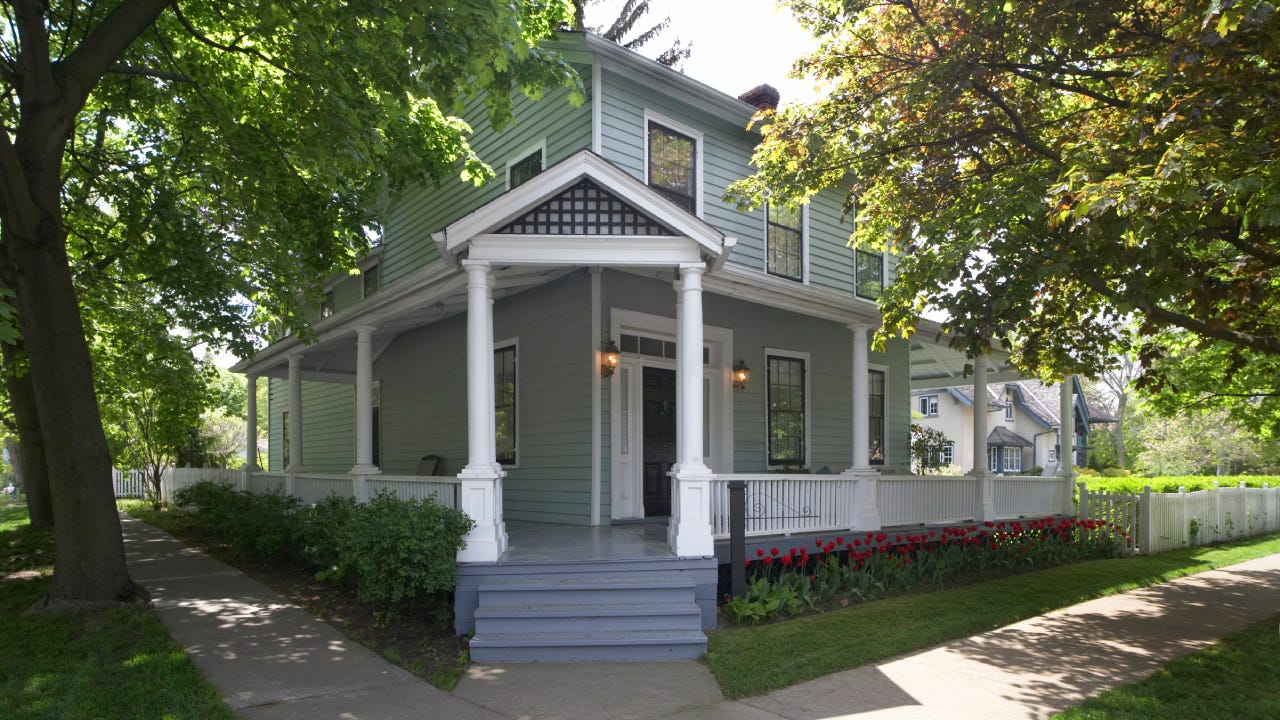Cost to buy a house in Georgia

If you’re considering buying a new home in the Peach State, join the club. Georgia is the nation’s fourth-fastest-growing state, adding more than 116,000 people between 2022 and 2023, according to U.S. Census Bureau data. Residents can count on hot summers and mild winters, and they can also predict with relative confidence what it will cost to buy a house in Georgia, including down payment, closing costs, moving expenses and more. Read on for a breakdown of homebuying costs.
How much does it cost to buy a house in Georgia?
Let’s take a closer look at the Georgia real estate market. The median sale price of a home in June was $389,000, according to data from Redfin. That’s well below the nationwide median of about $427,000.
But it’s a big state, and housing costs will vary depending on your exact location. In Atlanta, for example, the median price was a bit above the national median at $434,460. But in nearby Alpharetta it was significantly higher at $777,000, and over in Savannah, it was just $345,000. In more rural areas, prices are likely to be much lower.
When determining how much house you can afford in Georgia, it’s important to assess how these price differences would impact monthly mortgage payments. According to Bankrate’s mortgage calculator, for a 30-year loan with a 6.8 percent interest rate and a 20 percent down payment for a median-priced Atlanta home ($434,460), the monthly principal and interest payments would amount to $2,266. For the same loan on a median-priced Savannah home ($345,000), that amount is just $1,799.
Down payment
Down payment amounts are usually a percentage of the home’s price. The larger a down payment you’re able to pay, the less you’ll need to borrow, which can save you plenty of money. Contrary to popular belief, a full 20 percent isn’t mandatory; however, reaching this threshold can eliminate the need for an additional monthly cost for private mortgage insurance.
Here are the minimum down payment requirements for several common mortgage programs:
- Conventional loans: 3 percent
- FHA loans: 3.5 percent (for credit scores of 580 or higher), 10 percent (for credit scores between 500 and 579)
- USDA loans: No down payment required if you qualify
- VA loans: No down payment required if you qualify
Saving for a down payment can be one of the biggest barriers to homeownership — after all, 20 percent of a $400,000 purchase is $80,000, a huge sum to save up and then pay all at once. The good news is there are financial-assistance resources available, especially for first-time homebuyers. Georgia offers several down payment assistance programs, and help for qualified applicants may be available at the federal and local levels as well.
Closing costs
Average closing costs in Georgia rank near the middle of the pack among all U.S. states, with a rate of 1.3 percent of the home’s price (not including real estate commissions) according to CoreLogic data. On a median-priced $389,000 Georgia home, that amounts to just over $5,000.
But buyers aren’t solely responsible for covering this full amount; these expenses are typically divided between both parties involved. For buyers, typical closing costs include fees related to securing a mortgage, as well as paying for services such as a home inspection and an appraisal (each usually costing a few hundred dollars). And while it used to be that sellers always covered the cost of the buyer’s agent’s commission fee, the rules have changed and some buyers will now have to pay their agents directly. Be sure your sale and purchase agreement specifically spells out which party is paying which agents.
And remember to budget for moving costs, too. The typical hourly rate for hiring movers in Georgia is $101, according to moveBuddha; total costs can range from a few hundred dollars to a few thousand, depending on the distance of your move and amount of items being transported.
Homeownership costs
Don’t forget, too, that all homeowners have regular maintenance and unforeseen emergencies to cover, so set aside additional funds in your savings for these costs. State Farm suggests budgeting approximately 1 to 4 percent of your home’s value annually for maintenance and upkeep costs. For a median-priced $389,000 Georgia home, this could mean up to $15,560 per year.
If you’re financing your purchase with a mortgage, homeowners insurance will likely be required by your lender. Luckily, Georgia’s home insurance rates are lower than the national average: The state averages $1,965 per year for $300,000 in dwelling coverage.
You’ll also need to pay property taxes, the rates of which will vary depending on your county and specific location. Additionally, if your property is within a homeowners association, plan for HOA fees as well. These costs can differ widely depending on the services and amenities provided.
Reducing costs to buy a house
There are several strategies you can pursue to make the cost of buying a Georgia house more affordable. Here are a few:
- Opt for a smaller property: People often start with starter homes for a reason — their smaller footprint makes them more affordable. Buying a condo or townhouse can get your foot in the door of homeownership for much less money than a single-family home. That way, you earn equity while you save up for a bigger purchase later on.
- Consider a more affordable location: While a waterfront estate or a home in Atlanta’s hippest neighborhood would be amazing, they might not align with your budget right now, and that’s OK. Broaden your search to include more budget-friendly neighborhoods for immediate savings, even if it’s not your forever home.
- Ask for seller concessions: Sellers may still be willing to negotiate certain costs in order to keep the deal moving smoothly. Asking for assistance with repairs or closing costs could potentially save you money.
- Keep an eye on mortgage rates: Should you buy a house now or wait for mortgage rates to drop further? It’s a valid question, and even a small drop in rates can spell big savings over the course of your loan. Be aware of the rate fluctuations while you shop around for a lender, so you can lock in the best deal possible.
Next steps
If you’re contemplating a new address in Georgia, reach out to a local real estate agent for guidance. The expertise of a knowledgeable Realtor can help you navigate your local market efficiently and find a property that meets your family’s needs and budget.
FAQs
-
As of June 2024, the median sale price for a home in Georgia was $389,000, according to Redfin data. That price can vary, sometimes significantly, depending on where in the state you’re looking to buy.
-
Closing costs in Georgia average about 1.3 percent of a home’s value, according to data from CoreLogic. (That does not include the cost of real estate commissions.) For a $389,000 median-priced Georgia home, 1.3 percent comes to a bit more than $5,000 — and that cost is split between the buyer and seller, not borne by just one party.
Why we ask for feedback Your feedback helps us improve our content and services. It takes less than a minute to complete.
Your responses are anonymous and will only be used for improving our website.






